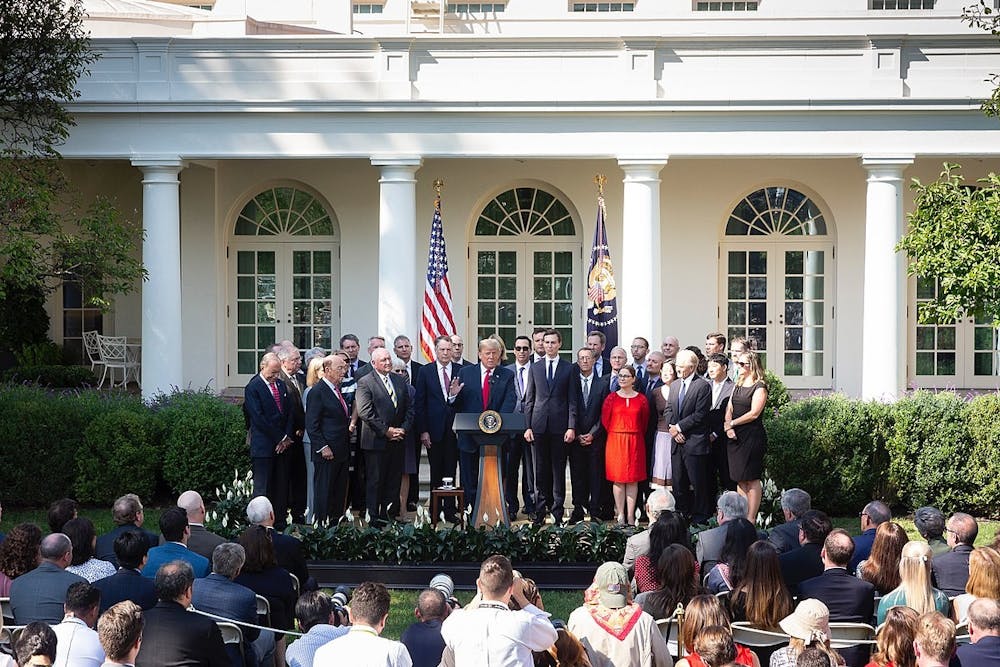Since Adam Smith wrote “Wealth of Nations,” opponents of freer trade from both sides of the political spectrum have rushed out of the woodworks to justify protectionist arguments. America’s history and affiliation with free trade has been a staple of our prosperity and innovation since World War II. One of the most important roles of the federal government — embedded in the very fabric of our nation — is to regulate (read: standardize) interstate commerce, effectively acting as a guarantor of interstate free trade. America was built on the ability to trade with people across borders, from farmers in the western territories to industrialists in the north and further overseas to Europe. On the other side of the coin, much of America’s success in expanding industrial capacity during the late 19th century can be attributed to a friendliness to foreign capital. Free trade has been essential to the health of the American — and world — economy. The Great Depression can be attributed to the anticipated passage of the Smoot-Hawley tariff of the 1930s. The tremendous growth of the American economy through the second half of the 20th century was also founded upon the international free trade system established by the General Agreement on Tariffs and Trade. Likewise, the European Union, which establishes a uniform and liberal set of trade regulations for member states, has been shown to drastically increase per-capita gross domestic product upon accession.
With the pronounced benefits of free trade and the current era of unmatched prosperity the world enjoys as a result of globalization, politicians should champion this most pluralistic institution. However, they have failed to adequately fight for freer trade. President Donald Trump ran on renegotiating NAFTA, and has almost assuredly succeeded in passing the more protectionist United States-Mexico-Canada Agreement with flying bipartisan colors. The unholy matrimony of labor interests and right wing economic populists that flocked to trade restrictions after the passage of NAFTA in 1994 has finally come to fruition. Today’s GOP has largely abandoned its former alliance with Reaganite free trade in favor of tariffs on allies and trade wars with China. This has had measured adverse effects on the very sectors meant to be aided by protectionist policy — manufacturing and agriculture. There is some promise still on the right side of the aisle, such as Senator Chuck Grassley’s, R-Iowa, suggestion that the executive’s authority to levy tariffs could be reduced.
On the Democratic side, I only wish they followed through on their usual opposition to the president for opposition’s sake. Sadly, during the primary debate on January 14, the six candidates on stage all presented disappointing perspectives on trade liberalization. Senator Bernie Sanders, I -Vt., flat out rejected the notion that American trade deals have improved lives and benefited consumers. Senator Elizabeth Warren, D-Mass., couched her support for the United States–Mexico–Canada Agreement — already relatively tight on trade — with her opposition to trade deals with Asian nations and with Europe. Senator Amy Klobuchar, D-Minn., focused on Ohio Senator Sherrod Brown’s preferences for USMCA — regulations and labor union demands. Pete Buttigieg, D-Ind., decried free trade agreements in general. Former Vice President Joe Biden, Senator Sanders and fellow Democratic candidate Tom Steyer promised to oppose any and all trade agreements without major climate provisions. With such leadership in stock for the Democrats, there is little room in the party for improving the lot of Americans through trade. With the evolution of both parties into an anti-trade stance, America will suffer increasingly dogmatic justifications for worse and more expensive goods.
Today’s trade policy trajectory is utterly foolish. Free trade is what brings nations together by disseminating values and building interdependence. It weaves together the European project, binds our fifty states together and spurs the innovation that built college news websites and makes people’s lives better. The permanent normalization of trade relations with China helps American companies with a comparative advantage in manufacturing, allowing our capital to focus on innovating newer, bolder products such as microchips and cellular phones that we all use in our everyday lives. If the parties refuse to acknowledge this apparent reality, supporting protectionism and economic nationalism, they will fail to harness our economic potential.
Still, changing the political winds is a daunting task. Hopeful defenders of free trade must be politically savvy, keeping in mind the causes of grassroots protectionism. Anxieties about job losses need to be addressed. This means both through tax and training relief for impacted areas and increased discussion about the effects of automation on jobs. Free trade’s reputation must be rehabilitated into a force for consumer benefits, instead of a job destroyer. It is a tool for creating trading blocs that can pressure international change — as the Trans-Pacific Partnership was meant to do with China — not a way of weakening the United States’ overseas clout. Most of all, restrictions to free trade ought to be regarded as antithetical to the Declaration of Independence, wherein Americans decried the British crown “for cutting off our Trade with all parts of the world.” Undoubtedly, the United States needs at least one party — left or right — that defends free trade, now and forever.
Bilge Batsukh is an Opinion Columnist for The Cavalier Daily. He can be reached at opinion@cavalierdaily.com.






